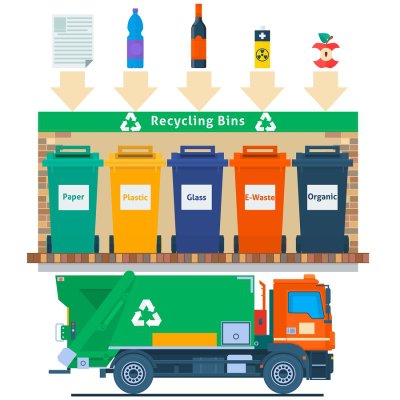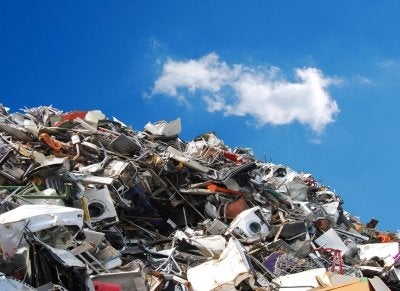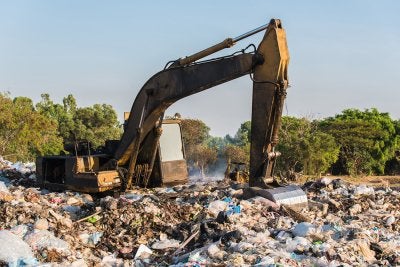-
Reasons to Improve Your Company’s Waste Management System
From recycling programs to waste audits, there are many strategies for cutting down on what your company tosses into its dumpsters in Atlanta, and there are several good reasons for you to improve your company’s waste management system .
The most obvious reason to make smart changes in the way your business manages and disposes of waste is that doing so can save you money. Additionally, by conducting a waste audit to learn what is filling your dumpsters, you can discover what types of waste and how much of each your company is producing, allowing you to make strategic changes. Also, better waste management practices mean that your company’s operations can have less of a detrimental impact on the environment, for example, by using fewer resources and producing fewer greenhouse gas emissions. Finally, making your business more environmentally friendly in this way allows you to create a greener image for your business that both your staff and customers can appreciate.

-
Exploring the Advantages of Food Recycling
While many people are familiar with the benefits of recycling materials like metal, glass, and plastic, fewer realize that unwanted food can be repurposed, as well. If you’re searching for ways to reduce your establishment’s waste in Atlanta, then read on to learn about the advantages of recycling food instead of throwing it in the trash.

Save on Operating Costs
When you implement a food recycling program for your business, it makes sense to conduct a waste audit, as well. Waste audits allow you to identify areas for improvement and which foods are being wasted most. For example, a waste audit may let you know that one of the items on your restaurant’s menu should go, as you frequently toss out the ingredients that you buy for it. Or, you may learn that your employees could be using ingredients more efficiently, allowing you to implement a new training program that may cut down on your business’ food waste.
Save on Waste Management Costs
By conducting a waste audit and learning where food is being wasted unnecessarily, you may be able to reduce what you spend on dumpster services.
Be More Environmentally Responsible
Any business that uses food on a regular basis, such as restaurants, grocery stores, schools, and food distributors, can make a beneficial impact on the environment by adopting a food recycling program. Food recycling serves a number of valuable purposes, allowing the waste to be repurposed in a variety of ways such as for feeding livestock or creating compost. Also, the anaerobic digestion process that is used to recycle food can be used to generate energy and reduce the need for electricity production.
Improve Your Business’ Image
Adopting a food recycling plan is an excellent way to boost your establishment’s reputation. By demonstrating that less of your food waste ends up in the dumpster and that more of it is being put to good use, you can generate good press and an environmentally friendly image for your company.
-
FAQs About Industrial Waste Management
Implementing an effective system for industrial waste management in Atlanta is important for ensuring that your company practices responsible, efficient, and environmentally-friendly waste disposal. To learn more, read on to discover the answers to common questions about industrial waste management.

What is industrial waste?
Industrial waste refers to non-hazardous waste materials that are generated through industrial activity. Some examples of activities that produce industrial waste include construction, textile manufacturing, and automotive maintenance.
Why does industrial waste management matter?
Proper industrial waste management is important for protecting the environment and human health. Also, improving your waste management practices through recycling, zero waste initiatives, and other measures may reduce your regulatory and business expenses.
What types of sites require industrial waste management services?
Some examples of locations that typically need industrial waste management include distribution, food processing, automotive, and manufacturing facilities, as well as warehouses and appliance manufacturers.
How can I reduce my facility’s need for industrial waste management?
There are several steps that you can take to cut down on your facility’s waste management needs. For example, you can upgrade to newer technology that produces less waste, ensure proper training for your employees, maintain your facility and equipment, and implement a recycling program. Also, you can work with your waste management service to track your facility’s waste generation and identify possible areas for improvement.
What is a zero waste initiative?
A zero waste initiative is a detailed sustainability plan that industrial facilities can implement. These initiatives offer companies a number of potential benefits, such as lower material and manufacturing costs, less waste production, and reduced waste management costs. More notably, beginning a zero waste initiative can give your company a greener image, as these plans are designed to help facilities operate in a way that is environmentally responsible and sustainable. If you’re interested in beginning a zero waste initiative, then contact your waste management partner to learn about their sustainability services.
-
How Plastic Waste Is Affecting Our Oceans
Millions of tons of plastic waste are dumped into the Earth’s oceans on an annual basis. This video from National Geographic shows the devastating effect that plastic waste has on the health of our oceans and marine life. With recycling serving Atlanta, you can help to keep harmful plastic out of the oceans. A company that offers recycling services can set you up with a sustainable plastic recycling program for your business.
If you would like to learn more about how to recycle, be sure to contact your local waste management professionals. By getting the facts about proper plastic disposal, you can make sure that you are doing your part to prevent harmful materials from entering our ocean’s delicate ecosystems.
-
Using Signage and Bins to Minimize Waste
When you create a brand new recycling program for your business, you will need to make sure that your recycling bins are properly labeled. This video will provide you with an overview of the benefits of using signage and bins to minimize waste. By creating clear signs for your recycling bins in Atlanta, it will be possible to make sure that your customers and employees are correctly following your waste disposal strategy.
After you have decided that you want to cut back on the waste that is generated by your business, your next step will be to rent or purchase the appropriate bins. From recycling bins to dumpsters and more, a waste management company can provide you with the tools that you need to properly dispose of your trash and recyclables.
-
Understanding the Categories of Hazardous Waste Generators
Hazardous waste is a byproduct of many industrial processes. If your business creates hazardous waste during its daily operations, you will need to create a waste management plan that complies with federal and state regulations. A company that offers dumpster rental near Atlanta can help you manage your hazardous waste and set up regulated waste disposal services for all of your byproducts. To assist you as you create your waste management plan, here is a closer look at the three categories of hazardous waste generators.

Conditional Exempt Small Quantity Generators
Conditional Exempt Small Quantity Generators are typically referred to as CESQGs. In order to fall into the CESQG category, a person or business must create no more than 100 kilograms of hazardous waste each month. If you or your business has recently been classified as a CESQG, you will need to make sure that you keep track of all of your daily waste products. It is also necessary to send your hazardous waste to a facility or waste management station that specializes in processing hazardous goods.
Small Quantity Generators
Small Quantity Generators create more than 100 kilograms of hazardous waste each month, but their hazardous waste totals must not reach more than 1,000 kilograms in a month’s time. For the first 180 days of their operations, Small Quantity Generators are allowed to operate without receiving federal hazardous waste permits. Each Small Quantity Generator must process their waste in an approved container or tank, and there also needs to be an emergency response coordinator on site to deal with unexpected leaks or spills.
Large Quantity Generators
Large Quantity Generators are typically major industrial facilities that create upwards of 1,000 kilograms or more of hazardous waste every month. Each Large Quantity Generator must have its own, on-site containers or approved waste disposal bins. According to EPA regulations, Large Quantity Generators must also meet all standards that are set out in the hazardous waste manifest. A Large Quantity Generator must also provide written reports to the EPA twice during each calendar year.
-
Spotlight on Types of Landfills
When you toss your garbage in the nearest dumpster, you may not give a second thought as to where it heads after it has been collected by a trash pickup service. In fact, there are several different kinds of landfills that serve various waste management functions. After you set up dumpster rental near Atlanta, you may want to ask your waste management professionals about the different types of landfills that are used to process your waste. To help you understand common waste management practices, here is an overview of three of the most common types of landfills.

Municipal Solid Waste Landfills
Household trash and rubbish is typically sent to a Municipal Solid Waste Landfill, or MSWL. MSWLs are located across the United States, and each city, town, or county typically has its own landfill site. These landfills must be located at a safe distance away from neighborhoods and commercial districts, and they must also be equipped with liners and leech collection systems that prevent the surrounding groundwater from becoming contaminated.
Industrial Waste Landfills
An industrial waste landfill is specifically designated for the disposal of solid industrial waste products. Industrial waste landfills are engineered to safely house a variety of different types of industrial waste products, including plastic, glass, concrete, and construction debris. Along with collecting industrial waste, these landfills also serve as disposal sites for construction debris. It is important to note that hazardous waste products, such as asbestos, cannot be processed at a standard industrial waste landfill facility.
Hazardous Waste Landfills
A third type of landfill is known as a hazardous waste landfill. Since these landfills are designed to house many different types of hazardous waste, they are subject to strict regulations from the EPA. Every hazardous waste landfill must contain a double liner, runoff control system, and leak detection technology. Hazardous waste landfills are routinely inspected to make sure that they are not leaking harmful materials into the surrounding environment. If your business generates hazardous waste, you will need to make sure that your waste materials are being delivered to one of these landfills.
-
Reducing Paper Use in the Office
Instituting a recycling program for your office is an excellent way to make your business more environmentally friendly. However, taking steps to reduce your need for waste management and recycling in Atlanta is another approach to promoting a greener office. Watch this video for tips on reducing the amount of paper that your office uses.
The average office worker goes through about 1.5 pounds of paper each day, which is an amount that can add up quickly. In addition to using recycled paper and recycling bins in your office, you can make your business greener by reducing your paper use and going digital as much as possible. Also, instead of printing off articles, read them on your computer or mobile device. When you do need to print something, print only the pages that you absolutely need to reduce your paper use.
-
Exploring the Dangers of Trash
Everyone has to do something with the waste near Atlanta that they generate, or it will continue to pile up. Without trash pickup services, the aesthetic appeal inside and outside of your building may be at risk. Unfortunately, there are many other potential hazards in addition to reduced cosmetics. When waste piles up, it may ultimately attract pests. These pests are eyesores in themselves and can turn people away from your home or your place of business, and they can even spread disease to your family or your customers. Continue reading if you’re interested in exploring the dangers of trash.

Cosmetic Eyesore
The curb appeal of a home or business place can impact the overall appearance of the neighborhood, which means everyone in the community may be concerned. If you allow waste to pile up on your property, keep in mind that you might be bringing down your neighbors’ property values. Some people let waste build up inside their buildings, which can also be detrimental. This will take away from the interior design scheme that you’ve worked so hard on, and it can reduce the overall value of your property. If you want to preserve your curb appeal, it’s a good idea to develop a waste management plan.
Attraction of Pests
If you know anything about pests, you know that they tend to show up when there’s a bunch of waste around. Neglecting your trash can serve as a warm welcome for all kinds of bugs, rodents, and pests, and they will further take away from the curb appeal of your house or business. Even if the waste problem is outside, the pests that it attracts may very well find their way in.
Introduction of Disease
Waste buildup and pest problems aren’t just aesthetic issues—both of these problems can actually be harmful to your health. The pests that come to check out your waste can spread disease through bites and physical contact as well as traces of urine and feces left behind. Make sure you establish a viable waste management plan to keep your space free of disease.
-
Why Is Sustainability Important?
You’ve heard about how recycling serving Atlanta is an environmentally-friendly practice, but you might not know why it’s so important to protect the environment in the first place. Responsible waste disposal makes for an investment in our future and can limit our use of nonrenewable resources, which can in turn have an impact on our overall social consciousness. The right waste management program can even save you money and help to stimulate the economy. If you’re thinking about going green, please continue reading to find out why sustainability is so important.

Investing In the Future
If we want our future generations to thrive, we have to pay attention to the way we shape the world they’ll be living in. In order to be sustainable, we need to figure out how we can limit our use of nonrenewable resources and follow more environmentally-friendly practices. Recycling is an excellent example of a “green” practice that can help secure a healthy planet for future generations to enjoy, but there is much more to be done as well. Businesses can seek waste management professionals to advise them on how they can adapt and become more sustainable.
Progressing Socially
The fact that people are embracing the idea of protecting the environment is a great sign. It’s becoming more and more difficult to ignore the impact that we have on the environment, and nothing will change unless the whole mindset of our society commits to being more responsible with our waste management. Initiatives like recycling and solar energy are already helping to mitigate the damage that humankind does to the environment, and the concept of sustainability has opened the door for discussion.
Boosting the Economy
It’s not just the environment that benefits when you practice sustainability. By using renewable energy sources, we save ourselves money and stimulate the economy. Even recycling can put money back in the pocket of the consumer while keeping reusable waste out of landfills and putting them back into circulation. If you want to fill your wallet instead of another landfill, think about how you can contribute to our society’s sustainability.
RECENT POSTS
categories
- Uncategorized
- Waste Management Atlanta
- Waste Disposal and Recycling
- Hazardous Waste Disposal
- Chemical waste removal
- solid waste removal
- R3 Program
- Sustainable Organizations
- Sustainable Waste Removal
- Commercial Waste Removal
- Materials Management Program
- Dumpster Rental
- Roll Off Dumpsters
- Construction Site Waste Removal
- Sustainability
- Recycling in Atlanta
- Industrial Recycling
- Industrial Waste Removal Services
- Southern Waste & Recycling
- Waste Removal Atlanta
- Waste Specialists
- Atlanta
- Infographic
- Front Load Dumpsters
- Rear Load Dumpsters
- Reusable Electronics
- Dump Truck Atlanta
- Recyclable Electronics
- Trash Compactors
- Recycling
- Recycling Program
- Office Recycling
- Metal Recycle
- Electronic Waste
